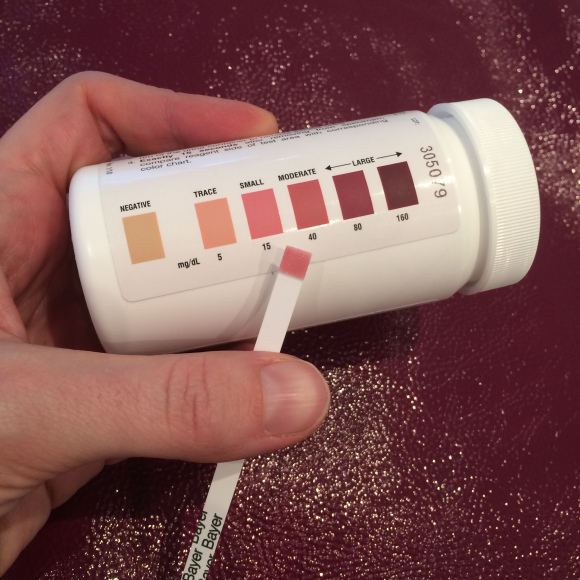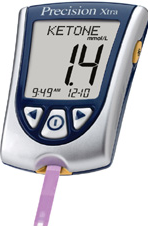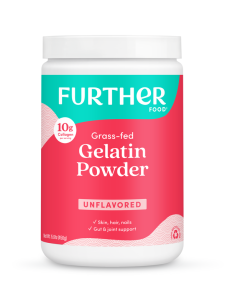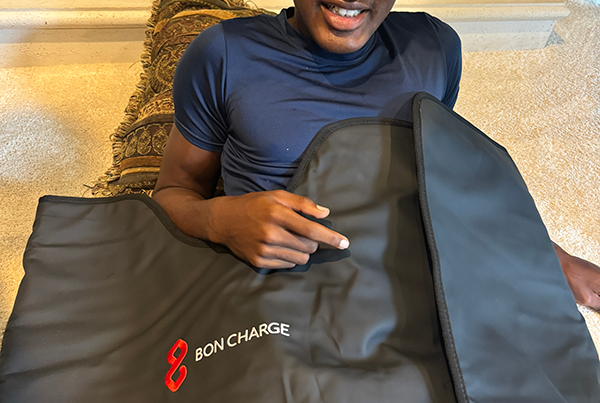Testing for Ketones
3 Types of Ketones
How to go about testing for Ketones? There are 3 types of ketone bodies. Acetone, Acetoacetate and Beta-Hydroxybutryate (BHB, though technically not really a ketone body)
The body (the liver) converts long and medium chain fatty acids into BHB and Acetoacetate. BHB and Acetoacetate live in reversible equilibrium (they can transform back and forth). Acetoacetate can also be turned into acetone. After converted to acetone, it can not be converted back. Acetone is typically excreted through the urine or breath.

If your body has been in ketosis for a while, you will see a reduction in acetoacetate. Muscles begin to use acetoacetate and turn it into Beta-Hydroxybutryate for fuel, so less is present in urine as you get more keto-adapted. This is the flaw of the urine test. It only tests for acetoacetate so it will go down as your body gets more efficient at using ketones for fuel.

3 Methods for Testing Ketones
Urine strips only test acetoacetate.
Ketonix only tests acetone in breath.
Blood Strips test for Beta-Hydroxybutryate (BHB), what your body uses for fuel.
1. Urine Test Strips
Ketostix
Pros: Cheap.
Cons: Very inaccurate in testing level of ketosis.
Our bodies excrete excess ketones in two ways. Through the urine or through the breath. When you are testing for ketones in urine you will typically see higher levels in early stages of a ketogenic diet because your body isn’t using ketones for fuel yet. After you are fully Keto-Adapted (2-4 weeks or so), you will see less and less ketones in your urine because your body in now using more ketones for fuel instead of excreting them through the urine or breath.
The urine test strip is also very susceptible to changes based on your state of hydration. The more hydrated you are (and we should all be drinking more water with a ketogenic lifestyle) the lower the ketone level on the urine strip.
2. Breath Ketone Testing
Ketonix Breath analyzer
Pros: Low long term cost ($99 up front with no ongoing cost), Accurate (testing Acetone).
Cons: Doesn’t always directly correlate to Blood Ketones, Alcohol consumption can show false positive, Drinking lots of water can effect results (which we should be doing).
Breath testers test your breath for Acetone. This is what some people call “keto breath”. This is also a waste product of ketone metabolism. It gives you a good idea of how much your body is turning fat into fuel, but isn’t directly correlated to the BHB in your blood.
3. Blood Ketone Testing
I like the Precision Xtra model best.
Pros: Very Accurate, Tells you how much ketone bodies are available in the blood for fuel, Optimal range is 1-5 (2-4 great for weight loss).
Cons: Expensive – $4 or more per strip, Finger prick for blood required.
Blood ketone testing is measure the amount of BHB in your bloodstream and thus how much energy is available to fuel your body.
CLICK HERE for the one I like best
Notes About Ketonix vs. Blood Meter
Blood meters show amount of energy (BHB) in the blood that is available for the body to use as fuel
• Higher number, the more the body can use and is using ketones for fuel
• Blood ketones tell you how much energy is in your tank (when in ketosis)
• Breath ketones (acetone) is a good indicator of ketosis
• Ketonix measures the process of fat being turned into ketones (not necessarily how much ketones are in blood)
When to Test Ketones
In the Morning in fasted state will give you the best idea of your body’s ongoing state of ketosis. In general, ketones will be the lowest of the day in the morning. If decent ketone levels are present (1.0), this indicates a state of ketosis is being held through the day.
Ketones go up during the day if eating a good keto diet, especially after very ketogenic meals (MCT oils, etc). It also goes up after intense exercise. MCT oils increase ketones (Coconut oil, etc). In the evening you will generally show higher (maybe highest) level for the day (2.0-3.0 is great).
What is a Good Ketone Level
Ketosis is defined as a blood ketone (BHB) range of 0.5 to about 5.0 mmol. This is the range where the body is using ketones for its primary fuel source. The ideal range for weight loss and healing really depends on a lot of factors.
More is not better when it comes to ketones. Many studies have shown that above about 4 to 5 mmol there is not any added benefit. And if you are metabolically damaged (insulin resistant) your body won’t be able to utilize ketones for energy as well as others that aren’t insulin resistant. So that can result in higher ketone levels. Also, if you don’t workout it can also result in higher levels. Blood ketone levels are simply the difference between ketones produced and ketones used.
Some athletes and bodybuilders can be in strong ketosis based on their diet and exercise but have ketones of 0.3 because they are using all the fuel their body generates (ketones). So that is why the absolute level of blood ketones isn’t really that relevent to weight loss and healing. Some do great at 0.3 or 0.6 and other do well at 2.0. What needs to be a focus is getting carbs to 20g total or less and protein moderate (0.7 to 0.8 times lean body mass). If that is correct, your body will be in ketosis.
Too high of a ketone level can lead to a state called diabetic ketoacidosis (DKA). This is where ketones get to 10 or higher and in extreme cases can lead to death. But this level of blood ketones is only seen in people with severe beta cell (pancreas) issues (type 1 diabetics). Dr. Peter Attia says it best here:
“A person with a normal pancreas, regardless of how long they fast (including the fellow I reference above who fasted for 382 days!) or how much they restrict carbohydrates, can not enter DKA because even a trace amount of insulin will keep B-OHB levels below about 7 or 8 mM, well below the threshold to develop the pathologic acid-base abnormalities associated with DKA. Let me reiterate, it is physiologically impossible to induce DKA in anyone that does not have T1D or very, very, very late-stage T2D with pancreatic “burnout.” (Dr. Peter Attia, Ketosis – advantaged or misunderstood state? (Part I))”
CLICK HERE for my “The Keto Life” video that explains this and much more in great detail. You get 2 hours of great educational video on how to live the Keto Life. Also, our KETO-30 MEAL PLAN PACKAGES contain a video that explains this and much more.
Want to learn more about ketones and ketogenic diets? My book “Keto-Adapted” has everything you need to know. CLICK HERE to get it.
TESTIMONY OF THE DAY

















I have on Keto for a while more then a year. Lost 15kgs eating Maria’s way. But when I test my Urine the color still changes and when I test my blood its in the region between 1-2.5mmol. When I check with the ketonix when I am my highest BHB it only flashes yellow!!!!
Am I Keto adapted or still adapting???
This is the difference between testing from urine and testing from breath–different kinds of ketones are going to register different levels. You need to pick one format (breath, urine, or blood) and stick with it for more consistent readings. Since the more accurate method is with breath, I’d stick with your Ketonix. Read what Maria wrote above concerning testing for ketones in urine–VERY INACCURATE.
Thank you!
They are all testing different types of ketones. Urine is so inaccurate.
Use blood tester for fat burning ketones.
Your body is producing good ketones (1-2.5mmol in blood) so you are definitely in ketosis. Showing more in urine is ok and can depend on your activity level. If activity level is lower, more ketones will be flushed out through urine or breath.
wow, thanks for the great article and reminder Maria. you are always looking out for us. lost a total of 74 pounds and am now exercising! thanks Maria for all you do.
Way to go Janet! Thanks!
I watched your video but this clarifies a few things for me that I must have missed in your video. Thank you!
Thanks for the great article! It answered some questions I had about the breath test. I have been on the ketogenic diet since last October and have not lost a pound but gained a few. I have 10 lbs to lose. I love the other benefits from the diet and the medical research is amazing! It just seems like I must be missing something. So many
people have such amazing results with weightloss.
I used to be really fond of the Ketonix but now I see the blood -o – meter is perhaps better.
How often do you recommend testing for blood ketones?
I used to buy my blood test strips at an online Canadian pharmacy, but they stopped taking Visa, for some reason, and i refuse to get another credit card, just for the purpose of buying them.
I wish the industry would realize the market for these strips and make them less expensive in this country.
I just ordered from them with Visa. They take it, they just add a step when ordering to have their billing dept call you. 🙂
Which pharmacy are you using? I was with Universal, I think. It’s been a while. I’d like to try to get them again.
I drink one cup of coffee in the morning (bulletproof) w/stevia. I have my morning drink. Lunch I’ll eat either a piece of chicken or fish, with more often than not loaded cauliflower (butter, cheese, bacon bits), a cup serving. As I stated earlier, salt is out of my diet. Yesterday I consumed over 100 ounces of water, and finished my day with a drink. This morning, I was up an additional 2 lbs, making a total of 8 lbs since Saturday morning. Apparently, 1940 mg of sodium is knocking my body for a loop. I do 30 mins of exercise daily, sleep 8 hours. The “tool” is not giving me any energy, I’m about to drop on my desk I’m so fatigued.
Sounds like too much protein and maybe too many carbs too (cauliflower can add up). Chicken and fish are both high in protein and low in fat. Up the fat. Shoot for 80% fat, 15% protein and 5% or less total carbs.
Also, I don’t recommend bullet proof coffee. Chewing calories registers leptin better.
Hi Maria, you say that “The ideal range for weight loss and healing is about 2 to about 4 mmol.” Do you have any scientific references for that?
The best would be Volek and Phinneys work. I also base it on experience with clients. 🙂
http://astore.amazon.com/marisnutran05-20/detail/0983490708
Hi Maria,
This sounds interesting — but I also need to be dairy free as well as gluten free. Any suggestions in terms of the 3-day meal plan? Cannot have cheese, unless it’s feta or hard cheeses like Parmesan, and even then very sparingly. Thanks very much!
Yes! My meal plans are all dairy free;)
My Keto-30 Advanced package is nut and dairy free. 🙂
http://mariamindbodyhealth.com/keto-30-advanced/
Maria, I love your Ketogenic Cookbook. You said to keep our protein around 15%, but what does that look like in terms of ounces per meal? Thank you.
20-30grams
A tool that would help me greatly would be an apps, a programm or a guide that would tell me, let’s say I put together a meal with for example a 6 oz of beef, a cup of coliflower, 6 stems of asparagus, 1.5 oz of butter, 1/2 a cup of chicken broth and 3 oz of 35%cream and would tell me how many gram of carb, protein and fat I got in my meal.
Does that exist somewhere?
My fitness pal does that
Depends on your lean body mass. I shoot for 0.7 times your lean mass in protein grams a day. For most women that is typically around 60-90g or protein a day. 🙂
Have been eating a keto diet for the past two weeks (under 10g of carbs per day). Tested my ketones this morning using blood test and was at 5.4 – is this too high. How do I keep it in the optimum range?
That is a great range!
So 0.8 at the end of my night shift right before bed…good? Or too low?
That is a bit low.
Maria — Thanks for a clear and succinct discussion of the correlation between acetone, acetoacetate, and BHB. As a biohacker “hobbyist” :-), I regularly test myself with Ketostix, Ketonix Sport, and Precision Xtra, and have kept a log for almost year now. There are some gaps in the Precision Xtra readings because of the cost issues, but the data I’ve collected shows that correlation of ketone readings between these tools is not very precise.
Have you ever tested yourself after taking l-glutamine?
No, but I’ll give it a try. Just picked up some l-glutamine today.
What are you using it for?
I think that my meal plans could help a lot! I have a ton of tricks in there;). Cut all dairy and nuts. Don’t subtract fiber.
I have been on a lchf for 10 days. I took the ketone blood test on the 5th day and i was 0.6.
Today 10th day i measired again and it was 0.2. I’m very sad. 2 days ago i had whey protein for my sugar craving. Is it possible that this spoiled the ketosis? What can i do?
Yes. Dairy can do that. I would cut all dairy. Also don’t consume more than 20g protein at one sitting.
Marie,
I am wondering what “online Canadian pharmacy” can get me my Novamax keto test strips? Jeanne & Maria discuss this on August 23, 2015. Thank you
You can try this one. 🙂
http://www.universaldrugstore.com/
Hi, I finally bought the precision blood ketone tester. After fast 22 hours I was 3.4 this afternoon. My friend read that Dr Phinney and Volek noted that .5 – 3.0 is optimal fat burning mode. I told her your numbers which were a little higher. Has this changed? I guess I am good!
I stumbled upon the ketogenic diet by supporting my husband in his weight loss journey and buying your most recent book.
I intended on doing the plan for a month, learn the recipes, freeze lots for him, then go back to my old way of eating. Well, I felt so amazing and enjoy the recipes and food so much, plus keto-adapted quickly and test my blood regularly at optimal levels that when 4 weeks past, I kept on going!
I’m one of the lucky ones who can eat lots of dairy and still register above 3 mmols. I’m wondering if it’s possible to over-do it? Should I get my cholesterol levels checked at some point to make sure I’m ok? If ketosis isn’t affected, is it ok to continue enjoying cream, butter, cheese etc? I love dairy and that’s part of why this meal plan works so well for me.
Side note, I miss very little about my old diet, except fruit and beets. I wonder if small amounts of beets when they grow in my garden, in a salad with lots of oil and feta would kick me out of ketosis.
I love this!!!!
I wrote a few posts about cholesterol. I also write about it in my book Keto Adapted. 😉
http://mariamindbodyhealth.com/cholesterol-facts/
Yep. They have a dairy free version now😍
I was wondering, does pregnancy affect your ketone levels? What’s an optimal ketone level for a pregnant woman?
Other than extra calories proportional to the pregnancy development, I don’t see pregnancy as any different than normal.